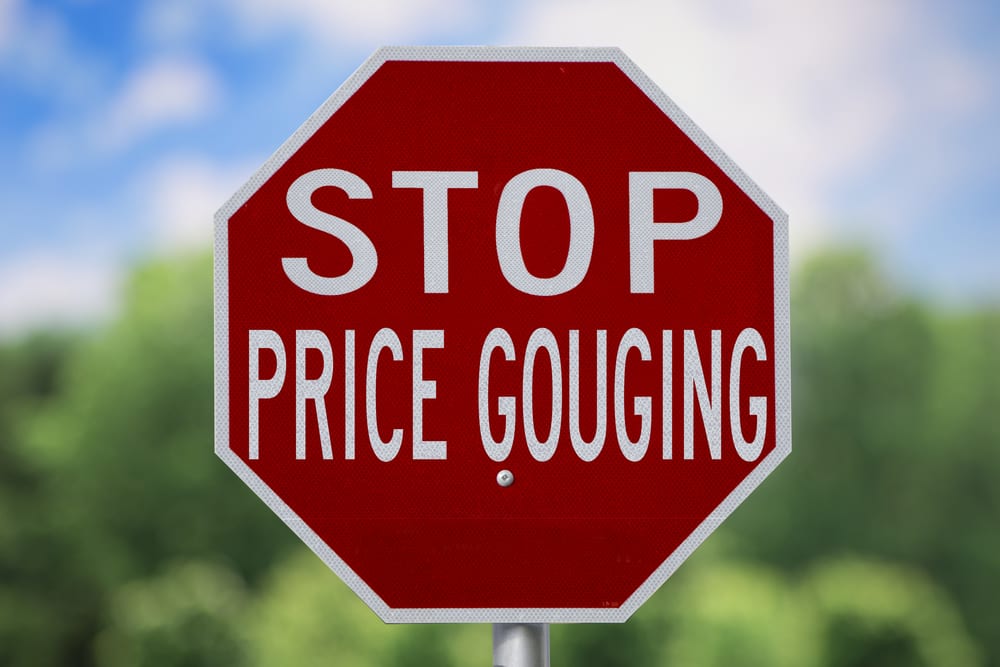Supply and demand drives the price of services and products. High demand for a product or service, leads to higher costs. The fluctuations in demand for a product can lead to minor or major fluctuations in how much the company can charge for a
Price Gouging
Supply and demand is a highly respected and legally acceptable business strategy … in most cases. The decision to hike prices during a natural disaster is an ethically and at time legally sticky business decision. The legal term for the practice is price gouging.
Price gouging, according to Legal Dictionary, is “the practice of raising the price of goods, services, or commodities, to an unreasonable or unfair level. Such an increase in price is often a result of a sudden increase of demand and shortage of goods, such as in the event of a natural disaster or other crisis.”
If your business is in or adjacent to an area prone to hurricanes, for example, the demand for necessary products like water, gasoline, first aid kits, flash lights, and hotel rooms will rise as individuals and families prepare to either ride out the storm at home or evacuate the area. At the same time, the supply of the necessary products will drop. The drop might be due to a decrease in open businesses, an increase in individuals purchasing the products, and potentially a temporary disruption of the supply chain carrying new goods.
Don’t Raise Prices
Your gut instinct if you find yourself in the midst of a crisis instigated shortage would be to increase prices. This is your opportunity to make a profit. And the law of supply and demand almost demands makes the change an economically savvy one. STOP.
Raising prices, for good or ill, has a long, long history. A long, long well documented history. And due to the fact that increasing prices of potentially life-saving products more costly, many US states and other countries have implemented anti-price gouging laws that might lead you into legal hot water if you do decide to increase prices during an environmental disaster.
Here is a list of states with anti-price gouging laws. (If your state isn’t on the list, you should double check that an anti-price gouging law wasn’t implemented after 2012.)
If you’re conducting business in a state without anti-price gouging laws, feel free to raise prices based on supply and demand. You need to approach the increase carefully though. You don’t have the potential for a lawsuit due to anti-price gouging laws, but you do have to contend with the fact that customers might feel cheated due to what they see as profiteering during an emergency.
Brand Image
In order to protect your brand image, businesses should give a good explanation why the increase in prices was financially necessary for your company. According to The Wall Street Journal, customers’ willingness to accept hikes in prices is due in part to “how fair they think it is.” Be transparent. Tell them if the increase in prices was due to a spike in shipping, ingredient, or running costs. They’ll understand if the increase is due to the inability of your business to survive without the increase.
If you do opt to raise prices dramatically, you might want to be prepared to give a good reason behind the change in price. For example, maybe your own businesses overhead costs, went up temporarily due to the emergency. If the reason behind the increase is simply to make a profit, you should do so knowing you might lose some customers.
Anti-price Gouging Laws
If you’re conducting business in a state with anti-price gouging laws, be sure to read the law before you make any changes to the price of your essential products or services. Basic consumer good items range from hotel rooms to food and water to gas and generators.
To be clear, anti-price gouging laws, do not prohibit any change at all, they simply prohibit excessive and unreasonable hikes in prices based on the market trend in the last month or so. Some states, like New Jersey or Alabama, have set a general baseline for what could be considered steering into price gouging territory. New Jersey business are legally considered price gouging if they hike prices above 10% of the normal market price. In Alabama, a price hike is only illegal if it’s 25% or above normal market price.
If your state doesn’t have a set percentage, I’d recommend not raising prices above 25% and to be safe conducting some personal research on past cases of price gouging in your state. You might be able to get a pretty good sense of what percentage of price increases is considered too much in your state before being hit by an excessive fine and in some cases having your business license revoked now and in the future.
It’s also important to note that legally many anti-price gouging laws allow businesses to implement what might be considered ‘unreasonable’ hike in prices under some circumstances. If the business can prove that the hike in prices was due to uncontrollable added costs the business incurred due to market changes rather than profiteering, they can legally increase their prices past what might be normally acceptable. (Just be prepared to prove that the change was necessary).
Conclusion
The economic principle of supply and demand are designed to aid businesses in making a profit. Businesses should be wary of making changes to the prices of necessary goods and services right before and during a disaster. In some cases, your country or state might have price gouging laws you must adhere to. In others, excessively raising prices could lose a business valuable long-term customers. While you might desire to increase your profit short-term during a disaster, you should implement price hikes carefully.
Image: Sign-Stop Price Gouging


